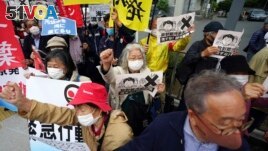13 April 2021
Japan says it will start releasing radioactive water from the destroyed Fukushima nuclear center into the sea beginning in two years.
The contaminated water is to be treated before it is released into the Pacific Ocean.
The government announced the plan Tuesday and said it had been approved by cabinet ministers. The decision had long been expected, but faced delays linked to safety concerns and public opposition.
Japan has said the water release is necessary to move forward with cleanup efforts at the Fukushima nuclear center. Three reactors there suffered meltdowns after the 2011 earthquake and huge ocean wave destroyed the plant's cooling systems. The disaster forced 160,000 people to flee contaminated areas around the plant.
Tokyo Electric Power Company, or TEPCO, operates the nuclear center. It is carrying out the cleanup. TEPCO said Fukushima will run out of all its storage space for radioactive water by late 2022.

People chant slogans against government's decision to start releasing massive amounts of treated radioactive water from the wrecked Fukushima nuclear plant into the sea, during a rally outside the prime minister's office in Tokyo Tuesday, April 13, 2021.
Japanese Prime Minister Yoshihide Suga said the government had decided the ocean release was the most realistic way to solve the water storage problem. Other methods considered included injecting the water into the ground or converting it to steam or hydrogen and then releasing it into the atmosphere.
The government describes the water to be released as "treated" and not "radioactive." But experts say that 100 percent of radioactive materials cannot be removed. TEPCO and government officials say tritium -- a radioactive form of hydrogen – is the only substance that cannot be removed from the water. They say tritium is not considered harmful in small amounts.
The officials say all other radioactive materials in the water can be reduced to releasable levels. The exact amount of radioactive material that would remain in the water is not known. Some scientists say the long-term effects on ocean life from large amounts of such treated water also remains unknown.
Fishermen and many people living in the area strongly oppose the plan. They have said releasing the water into the ocean could cause widespread damage to Fukushima's fishing and agriculture industries.
Suga said the government plans to offer assistance to help local agriculture, fisheries and tourism businesses.
The head of the International Atomic Energy Agency (IAEA), Rafael Mariano Grossi, said in a video message the ocean release was in line with international practice. He added, however, that "the large amount of water at the Fukushima plant makes it a unique and complex case."
China and South Korea reacted strongly to Japan's decision.
China called the plan "extremely irresponsible," saying Japan had not considered the health concerns of neighboring countries.
In South Korea, the country's minister for Government Policy Coordination, said the plan was "absolutely unacceptable." He urged Japan to provide more information about how the water will be treated and how the plan's safety will be verified.
I'm Bryan Lynn.
The Associated Press and Reuters reported on this story. Bryan Lynn adapted the reports for Learning English. was the editor.
We want to hear from you. Write to us in the Comments section, and visit 51VOA.COM.
___________________________________________
Words in This Story
contaminate – v. to make something dirty or poisonous
convert – v. to change the appearance, form, or purpose of something
tourism – n. activities related to travel to a place for pleasure
practice – n. what people do or how they do it
unique – adj. very special or unusual
absolutely – adv. completely or totally (often used to make a statement more forceful)
verify – v. to prove that something is true